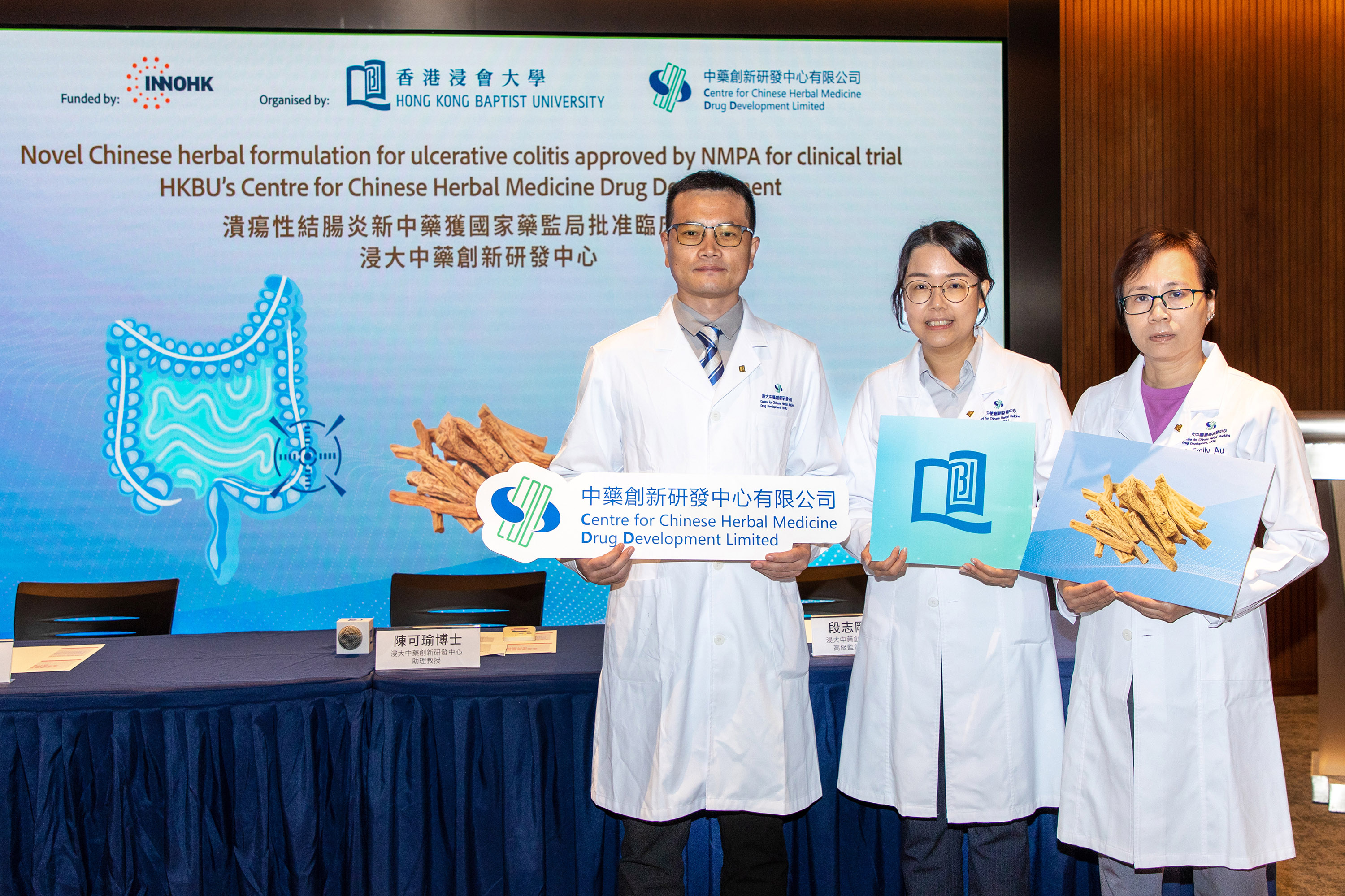Discover HKBU
New herbal formulation offers hope for remission maintenance of ulcerative colitis
30 Sep 2024


In early September, HKBU’s Centre for Chinese Herbal Medicine Drug Development (CDD) announced a promising milestone in developing a novel Chinese herbal formulation for ulcerative colitis remission maintenance.
For those suffering from ulcerative colitis, a form of inflammatory bowel disease, life can be debilitating. Apart from the discomfort of diarrhea, rectal bleeding and abdominal cramps, patients particularly in China and other Asian countries are also at risk of increasing morbidity. To date, the main goals for treating this disease are to relieve its symptoms, sustain the remission period, and reduce its recurrence. Current treatments for ulcerative colitis cannot completely maintain remission, nor prevent its recurrence.
Green light for clinical trial
In search of more effective treatments to relieve ulcerative colitis, CDD has successfully developed a Chinese herbal formulation known as CDD-2103. After submitting an Investigational New Drug application for CDD-2103 to the National Medical Products Administration (NMPA) in mid-June this year, CDD received the authorisation for its clinical trial in late August. A Phase II randomised, double-blind, and placebo-controlled clinical trial in the Mainland is in the pipeline for next year, to verify the effectiveness and safety of CDD-2103 as a treatment for remission maintenance for ulcerative colitis.
Developed in accordance with NMPA’s stringent quality control standards, the CDD-2103 granule has undergone a series of basic experimental studies, including preclinical pharmaceutical, pharmacology and non-clinical safety evaluations. Incorporating nine Chinese herbal medicines, such as Codonopsis Radix (dang shen) and Curcumae Longae Rhizoma (jiang huang), the CDD-2103 formulation targets patients experiencing symptoms of spleen deficiency and internal accumulation of damp heat.
In initial studies conducted in Hong Kong, patients who used CDD-2103 in a decoction format reported good tolerability, with no adverse effects. The research findings of its preclinical trials have been published in a number of scientific journals including Journal of Advanced Research, Phytomedicine and Journal of Ethnopharmacology.
A fusion of tradition and technology
Professor Bian Zhaoxiang, Associate Vice-President (Clinical Chinese Medicine) and Director of CDD at HKBU, says: “We are delighted that CDD-2103 has obtained approval to carry out a Phase II clinical trial in the Mainland. The Centre is optimistic that it can improve patients’ quality of life. CDD-2103 is a novel Chinese herbal formulation developed based on the modified ancient formulations combined with modern technology. Obtaining clinical trial approval from NMPA for this new drug is one of the important milestones of the Centre, which is also a recognition of the efforts of the research team in the development of novel Chinese herbal drugs.”
According to Dr Tan Hor Yue, Assistant Professor of CDD, larger scales of clinical trials are expected to be completed in the next five years, in order to confirm CDD-2103’s therapeutic effect and safety in treating ulcerative colitis. “After collecting sufficient data regarding the drug’s safety and efficacy, the Centre will submit an application for NMPA’s new drug approval, with the objective of obtaining authorisation for the sales of CDD-2103 in the market,” says Dr Tan.
Since its establishment in 2020, CDD has been focusing on innovative Chinese medicine research for gastrointestinal and immune-related diseases such as chronic constipation and ulcerative colitis. By merging traditional Chinese medicine with modern science, the development of CDD-2103 showcases CDD’s commitment and expertise in providing patients effective relief from their medical condition.